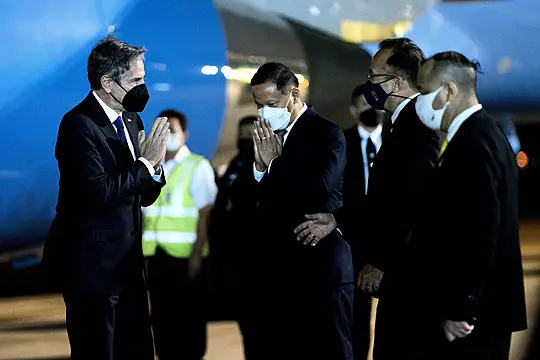The Biden administration has moved to strengthen ties with key south-east Asian ally Thailand as it presses ahead with efforts to counter China’s relentless push for influence in the region.
US Secretary of State Antony Blinken signed two co-operation agreements with his Thai counterpart in Bangkok, pledging to expand strategic co-operation and improve the resilience of supply chains.
Although modest, the deals fit into the Biden administration’s broader strategy for the Indo-Pacific, which is aimed at blunting China’s increasing assertiveness and offering alternatives to Beijing-sponsored development that many US officials regard as a trap for smaller, poorer nations.
Mr Blinken did not mention China by name in his comments with Thai Prime Minister Prayuth Chan-ocha or Foreign Minister Don Pramudwinai, but after signing the deals he said the US and Thailand “share the same goal of a free, open, interconnected prosperous, resilient and secure Indo-Pacific”.

American officials often use that phrase to refer to the prevention of Chinese dominance in the region, and US Defence Secretary Lloyd Austin had similar comments when he visited Bangkok last month and met Mr Prayuth.
Thailand is already a member of President Joe Biden’s Indo-Pacific Economic Forum, a bloc that was created earlier this year with the aim of curbing the momentum of China’s Belt and Road Initiative, which has poured billions into development and infrastructure projects throughout Asia and elsewhere.
Mr Blinken travelled to Thailand after attending an international conference in Bali, Indonesia, where he met Chinese foreign minister Wang Yi and warned that Beijing’s support for Russia on Ukraine poses a threat to the rules-based international order.
Like its predecessors, the Biden administration has watched China’s rapid growth warily and sought to hold it to international standards without significant success.
The US and like-minded democracies are trying to discourage developing south-east Asian countries from entering large-scale infrastructure and development projects with China unless they are proven economically feasible, structurally sound and environmentally safe.

Speaking in Bali, Mr Blinken said: “What we’re about is not asking countries to choose but giving them a choice when it comes to things like investment and infrastructure, development assistance.
“There is on one level plenty of room for everyone to do that because the needs are immense. But what we want to make sure is that we’re engaged in a race to the top – that is, we do things to the highest standards – not a race to the bottom where we do things to the lowest standards.”
US officials from multiple administrations have criticised China for exploiting smaller nations by luring them into unfair or deceptive agreements.
“My hope would be that if, as China continues to engage itself in all of these efforts that it engages in a race to the top, that it raise its game,” Mr Blinken said. “That would actually benefit everyone.”
Before returning to Washington, Mr Blinken will travel to Tokyo on Monday to offer condolences to senior Japanese officials following the assassination on Friday of former prime minister Shinzo Abe.







